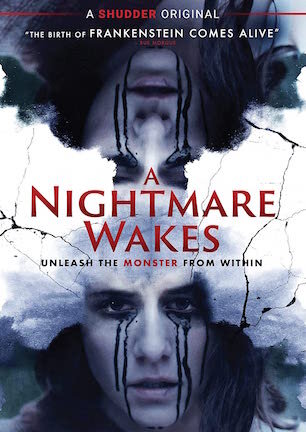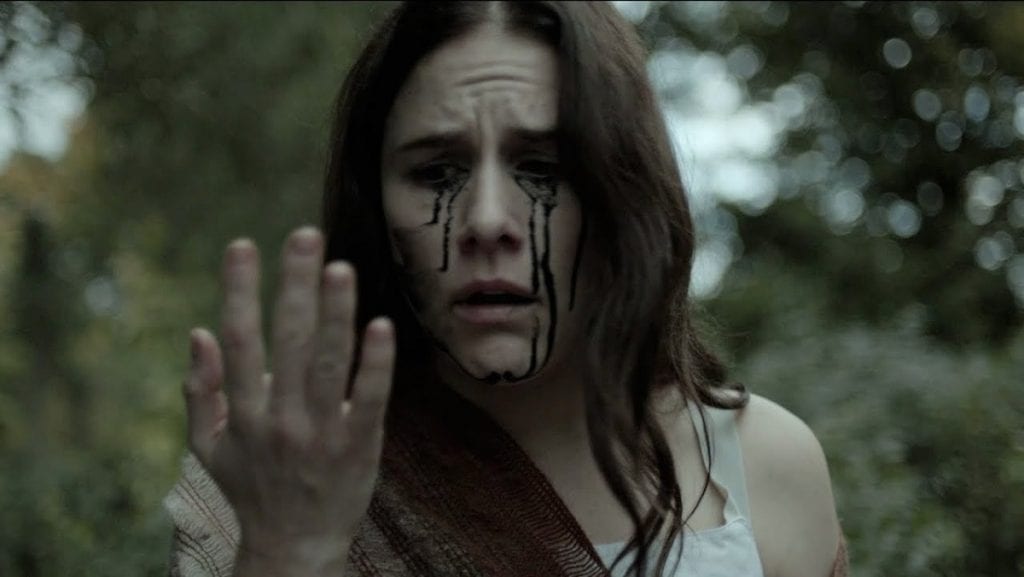A raucous summer spent in Switzerland by some of the most renowned Romantic poets and writers of the 19th century is what gave rise to the 1818 classic Frankenstein; or, the Modern Prometheus. Considered to be one of, if not the first examples of science fiction, the iconic story of a scientist playing God is still universally known and endlessly retold, almost to the point of redundancy (remember I, Frankenstein?). Luckily, writer and director Nora Unkel comes at things from a different angle. Her feature debut, A Nightmare Wakes, tells the story of the woman who wrote the novel, Mary Shelley, and how she gave birth to such a gruesome tale by channeling her own terrors and strife.
The film opens on a suitably morbid scene of a pregnant woman slowly wading her way into a lake. We watch as she disappears beneath the murky water, the camera lingering on the frame just long enough after she’s gone to drive the point home that this isn’t exactly gonna be a cheery movie. Mary Shelley’s life consisted of a string of tragic events in close succession to each other, and 'A Nightmare Wakes' depicts these in sobering detail and portrays how they weighed heavily on her mind. As she suffers slight after slight, she grows continuously engrossed in her work, and before long the line between the real, painful world and the world of her book becomes blurred in increasingly disturbing ways.

It’s the summer of 1816, and Mary (Alix Wilton Regan) is in midst of a whirlwind romance with poet Percy Shelley (Guillian Yao Gioiello). The two are joined by Mary’s stepsister, Claire (Claire Glassford), writer John Polidori (Lee Garrett) and the famous Lord Byron (Philippe Bowgen). Percy is a married man, which isn’t a secret to Mary, but that doesn’t stop Byron from attempting to embarrass her over the fact that she’s “the other woman”. It’s interesting just how much the film comes across as almost more of a period drama than a horror film, but a horrific scene of the first bit of misfortune to befall Mary acts as a solid reminder. Blood and the ink of her pen mix into a dark gunk; a motif that persists throughout the film.
When Byron challenges the group to come up with the scariest story possible, the losses that Mary endures serve as the catalyst for hers. “I feel like Michelangelo chipping away at the marble,” she tells Percy. As the traumas in her life lead to haunting hallucinations and dreams, she rushes to write everything down, losing sleep and roaming the hallways of the beautiful lakeside home like a ghost. As things grow worse, she begins losing time, finding entire passages of her book written down without her even remembering doing it.

“This is a story about a creature who craves love but only knows pain and terror.” she tells them. But is she speaking of the monster or herself? Mary’s relationship with Percy is anything but bliss. Percy is revealed to be a gaslighting and inattentive man who would always rather be out partying than with Mary, and he constantly plays the victim in order to keep the power on his side. Even with the eerie nightmare sequences, the true horror of the film just may be the constant torrent of mental and emotional abuse that Percy inflicts. Tragically, that manipulation eventually turns Mary almost entirely reliant on Percy, long past the point where she’s mentally stable and far past the point that he cares enough to do anything for her.
'A Nightmare Wakes' may be full of spine-chilling dreams and the odd jump scare (usually done visually instead of with noise), but its real scares come from the psychological downward spiral that we watch Mary go through. Her close friends no longer know what to do for her or even how to speak to her. The film steadily drains of color as it approaches its pitch black finale, and its frenzied classical score further conveys the shattered pieces of Mary’s mind, much like the scattered pages of her book litter the floor. But for those thinking that the movie is just a massive downer, or that this depiction of the writer is a bit of a disservice, the truth is that this is ultimately someone who used her trauma to create a literary masterpiece. It’s a tale of survival. Every catastrophe in Mary’s life further fueled her story; to write something as definitively scary as Frankenstein, you have to truly access your own nightmares.




